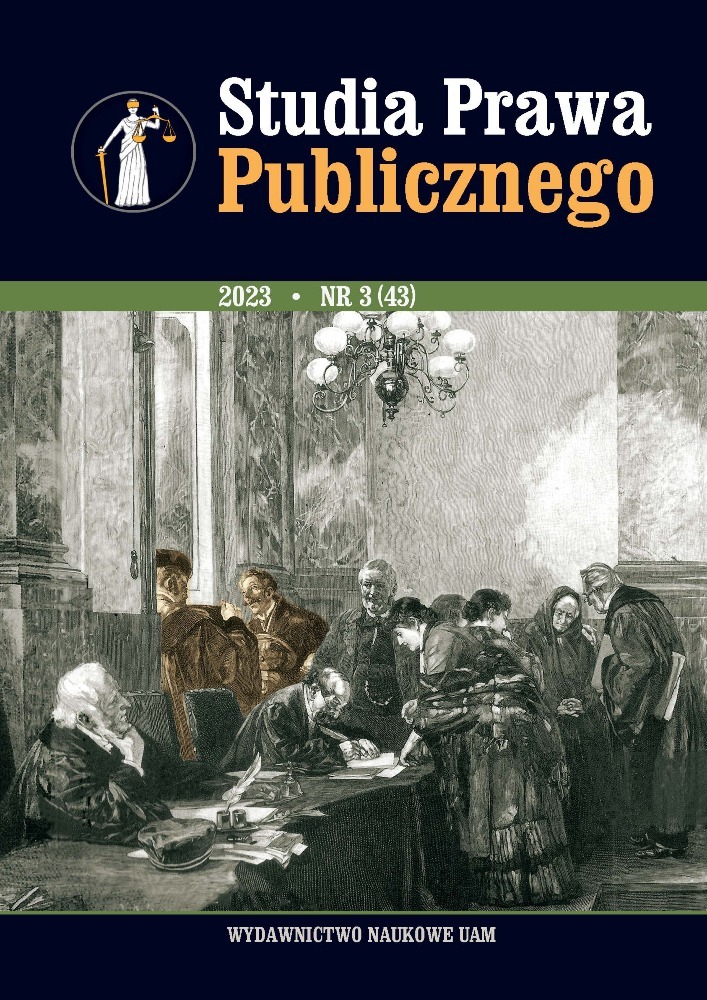Abstrakt
The article aims to indicate the most important issues facing an individual wishing to protect his or her privacy on the Internet. It also describes the evolution of the concept of the right to privacy, which over the years has become one of the most important subjective rights reflected both in the Polish Constitution and in the legal acts of the Council of Europe and the European Union. The text also demonstrates the approach to the issue of the right to privacy taken by both the Polish constitutional and international judiciary. The European Court of Human Rights in Strasbourg, in the cases of Dupate v. Latvia and Brother Watch and others v. United Kingdom, dealt with both the publication of photographs of a public figure taken surreptitiously in a private situation and mass surveillance. The Court of Justice of the European Union in Luxembourg, in its judgments, has often referred to the issue of the protection of telecommunications data, including the question of access by state services to such data (H.K case) and the rights and obligations created by Articles 7 and 8 of the Charter (Kärntner Landesregierung and Digital Rights Ireland Ltd case). The European Union authorities, reacting to the increasingly widespread problem of data flows on the Internet, decided to enact the General Data Protection Regulation (GDPR). The article describes the most important objectives and tasks to be fulfilled by this legal act. In addition, the main problems associated with the use of new technologies such as cybercrimes, cyber surveillance, data theft, as well as cryptojacking and the functioning of APTs (Advanced Persistent Threat), i.e. skilled hacking groups, are also indicated.
Bibliografia
Czubkowska S., Afera Cambridge Analytica. Facebook wybrał Amerykanom prezydenta. Czy nam też wybierze? I jeszcze na tym zarobi, Gazeta Wyborcza, 24 III 2018, https://wyborcza.pl/7,156282,23182834,afera-cambridge-analytica-facebook-wybral-amerykanom.html (dostęp: 6 V 2023).
Dudzik M., Kolejny ogromny wyciek danych – tym razem z LinkedIn, Tabletowo, 9 IV 2021, https://www.tabletowo.pl/linkedin-wyciekly-dane-ponad-500-milionow-kont/ (dostęp: 6 V 2023).
Florczak-Wątor M., Art. 47, w: Konstytucja Rzeczypospolitej Polskiej. Komentarz, pod red. P. Tulei, Warszawa 2019, s. 167.
Florczak-Wątor M., Art. 49, w: Konstytucja Rzeczypospolitej Polskiej. Komentarz, pod red. P. Tulei, Warszawa 2019, s. 172–175.
Grabowska-Moroz B., Ochrona gromadzonych danych telekomunikacyjnych i zasady ich udostępniania na tle Konstytucji RP i prawa Unii Europejskiej. Glosa do wyroku TS z dnia 8 kwietnia 2014 r., C-293/12 i C-594/12 oraz do wyroku TK z dnia 30 lipca 2014 r., K 23/11, „Europejski Przegląd Sądowy” 2016, nr 1, s. 31–36.
Kudła J., Dostęp służb do danych telekomunikacyjnych. Omówienie wyroku TS z dnia 2 marca 2021 r., C-746/18 (Prokuratuur), Lex/el. 2021.
Lubasz D., Art. 1, w: RODO. Ogólne rozporządzenie o ochronie danych. Komentarz, pod red. E. Bielak-Jomaa, D. Lubasza, Warszawa 2018, s. 105–118.
Madejski M., Cambridge Analytica – czym jest firma, która pokazała Trumpowi i komuś z Polski twojego Facebooka, Bezprawnik, 21 III 2018, https://bezprawnik.pl/cambridge-analytica/ (dostęp: 6 V 2023).
Mielnik Z., Prawo do prywatności (zagadnienia wybrane), „Ruch Prawniczy, Ekonomiczny i Socjologiczny” 1996, nr 58(2), s. 29–41.
Marr B., How Much Data Do We Create Every Day? The Mind-Blowing Stats Everyone Should Read, Forbes, 21 V 2018, https://tinyurl.com/bdccef2h (dostęp: 4 V 2023).
Największe zagrożenia bezpieczeństwa związane z chmurą, TyrantsThem, 2019, https://tyrantsthem.com/pl/artykuly/zagrozenia-bezpieczenstwa-chmura/ (dostęp: 6 V 2023).
Newman L.H., Hack Brief: Hackers Enlisted Tesla’s Public Cloud to Mine Cryptocurrency, Wired, 28 II 2018, https://www.wired.com/story/cryptojacking-tesla-amazon-cloud/ (dostęp: 6 V 2023).
New report: Time spent online falls to pre-pandemic levels, while social media use increases, Meltwater, 26 I 2023, https://tinyurl.com/bd7ch9yx (dostęp: 4 V 2023).
Olejnik Ł., RODO, zgoda i przetwarzanie danych – analiza, Prywatnik.pl, 8 I 2018, https://prywatnik.pl/2018/01/08/analiza-rodo-zgoda-przetwarzanie-danych/ (dostęp: 6 V 2023).
Podkowik J., Niezależna kontrola udostępniania danych telekomunikacyjnych, „Przegląd Legislacyjny” 2015, nr 2(92), s. 23–40.
Rojszczak M., Ochrona prywatności w cyberprzestrzeni w prawie polskim i międzynarodowym z uwzględnieniem zagrożeń wynikających z nowych technik przetwarzania informacji, Warszawa 2019.
Sakowicz A., Prywatność jako samoistne dobro (per se), „Państwo i Prawo” 2006, nr 1, s. 16–29.
Sarnecki P., Art. 47, w: Konstytucja Rzeczypospolitej Polskiej. Komentarz, pod red. L. Garlickiego, M. Zubika, t. 2, wyd. 2, Warszawa 2016, s. 248.
Sarnecki P., Art. 51, w: Konstytucja Rzeczypospolitej Polskiej. Komentarz, pod red. L. Garlickiego, M. Zubika, t. 1, wyd. 2, Warszawa 2016, s. 267–272.
Warren S.D., Brandeis L.D., The Right to Privacy, „Harvard Law Review” 1890, nr 4(5), s. 193–220. DOI: https://doi.org/10.2307/1321160
Licencja

Utwór dostępny jest na licencji Creative Commons Uznanie autorstwa – Bez utworów zależnych 4.0 Międzynarodowe.

